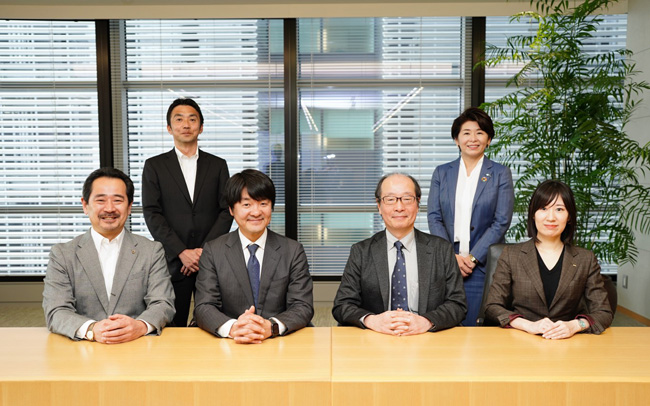View Sumitomo Corporation's Sustainability : Governance of Sustainability Management
The board of directors renders decisions concerning key management matters in light of the diverse opportunities and risks related to sustainability in the Group's wide range of business activities. Additionally, the board of directors oversees the decision-making and operation of the business by the management council and executive officers.
For decision-making on important management matters, the Board of Directors deliberates and determines on the formulation and revision of sustainability-related policies and targets, risks and opportunities in the overall business portfolio including sustainability - related, important initiatives related to the promotion of sustainability, and the handling of important issues related to policies on response to sustainability issues, which are submitted to the Board of Directors after review by the Management Council and its advisory bodies, including the Company Investment Committee, Corporate Sustainability Committee and Corporate Strategy Promotion Committee.
Furthermore, the Board of Directors receives regular reports on the strategy and progress of each business area, as well as on the status of risks and opportunities in the overall business portfolio including sustainability-related. Specifically, the Board of Directors receives reports on company-wide measures and themes several times a year, including a review of the progress of medium- and long-term goals based on materiality, a review of compliance with sustainability-related policies and sustainability-related risk and opportunities and supervises the status of initiatives by the business execution side as the Board of Directors.
In addition, the Board of Directors has identified the types of knowledge, experience, and competencies, etc. (hereinafter “Skills”) which enables the Board of Directors to adequately fulfill its roles of making decisions on important business matters and supervising business execution. Sustainability is one of the Skills. The Skills of individual Directors are determined after considering all their attributes, including their careers, knowledge, experience, capabilities, qualifications, and specific achievements, and discussing these with individuals concerned. For details, please refer “The knowledge, experience and competencies, etc. (Skills) that the Board of Directors is required to possess, and Skills that Directors or Audit & Supervisory Board Members currently in office possess”.
Also, to ensure that the Company's officers, including directors, are more aware of our commitment to the advancement of sustainability management, evaluation based on the non-financial indicators (“climate change”, “promotion of women's active engagement” and “employee engagement”) is used to calculate the amount of the remuneration of officers. For details, please refer to “Executive Remuneration Plan”.
Management Council and executive management are responsible for decision-making and business execution of important sustainability-related management matters of the Group according to the company regulations. The Management Council makes comprehensive decisions after consulting with the Corporate Sustainability Committee and other committees in order to assess and manage sustainability-related risks and opportunities and make effective decisions.
In addition, with regard to sustainability-related initiatives and responding to risks and opportunities, the Corporate Sustainability Department, which is a specialized organization in charge of planning and disseminating measures to promote sustainability within the Company, and related corporate organizations such as the Corporate Planning & Coordination Department, which plans the Company's overall management plan and important measures, as well as the person in charge of sustainability promotion in each business group, and overseas regional organizations work together. Based on information provided by the Company's internal research organizations, the Business Groups, overseas regional organizations, etc., we formulate and promote company-wide plans and measures.
In addition, we have established the Sustainability Advisory Board, which is comprised of outside experts on ESG, to obtain advice and recommendations on our overall sustainability management.
The corporate governance structure for our sustainability management is as follows.

In FY2024, we convened the Sustainability Advisory Board three times. On one of these occasions, members of the Corporate Sustainability Committee also participated, contributing to a constructive dialogue. The Advisory Board members provided valuable feedback and recommendations on various aspects of our sustainability management, including progress toward climate-related goals, our approach to natural capital, and the enhancement of human rights due diligence. These insights were accompanied by a positive assessment of our overall efforts.
For example, one of the key topics discussed was focused on our medium-term goal, “Accelerate initiatives toward a nature-positive world by 2030,” which is part of our Material Issues. The discussion highlighted the importance of promoting initiatives that both mitigate risks and create opportunities, recognizing natural capital as a vital source of value creation.
We have registered as a TNFD Early Adopter and disclosed information in line with the TNFD recommendations in September 2025. We will continue to engage in dialogue with the Advisory Board members and a wide range of stakeholders to further advance our sustainability initiatives.

External Advisors (As of FY2024)
Sadayosi Tobai, Chief Executive Officer, WWF Japan
Hidemi Tomita, Chief Executive Officer, Institute for Sustainability Management
Takashi Nawa, Professor, Kyoto University of Advanced Science and Visiting Professor, Hitotsubashi University Graduate School
Junko Watanabe, Attorney-at-Law, Nishimura & Asahi (Gaikokuho Kyodo Jigyo)